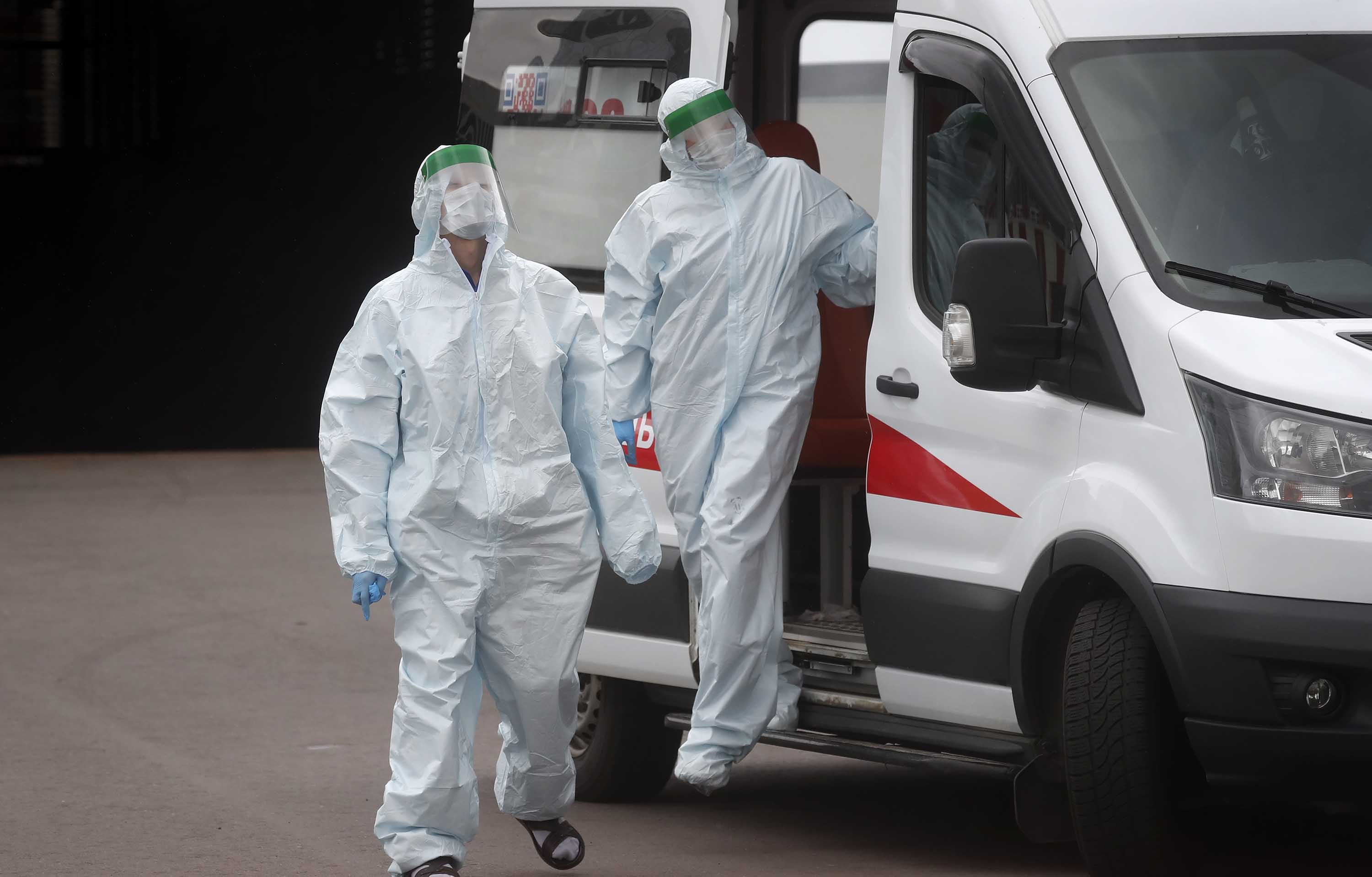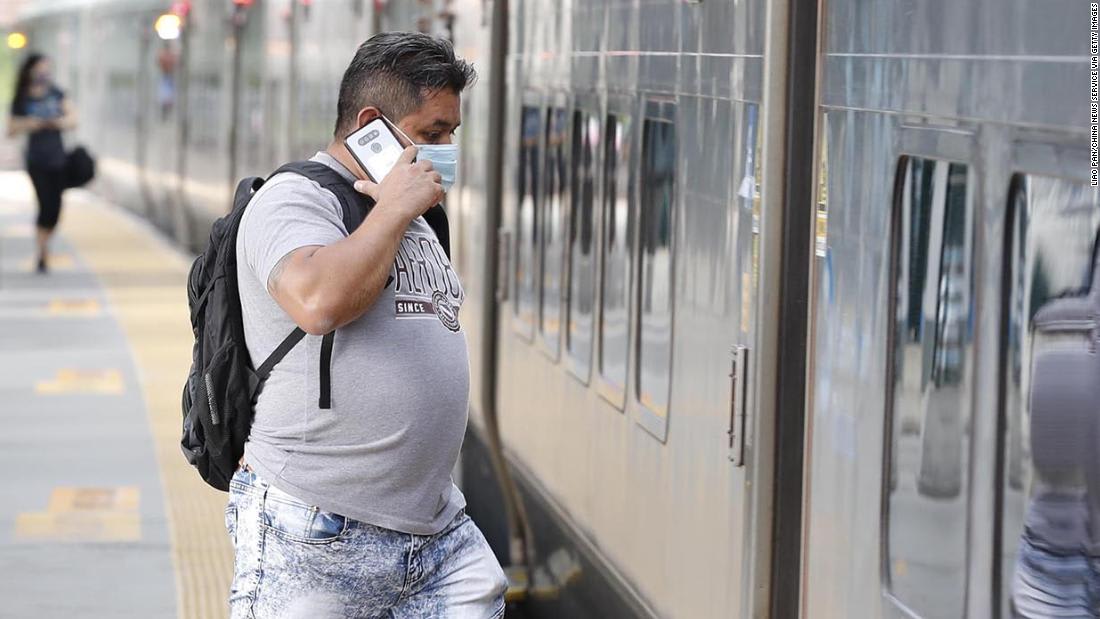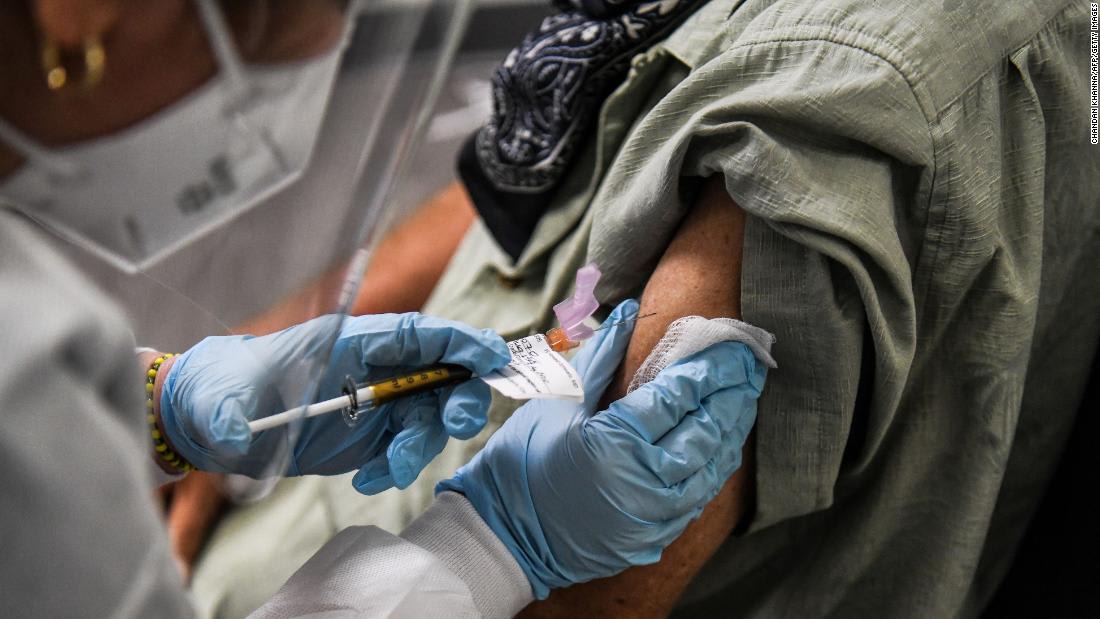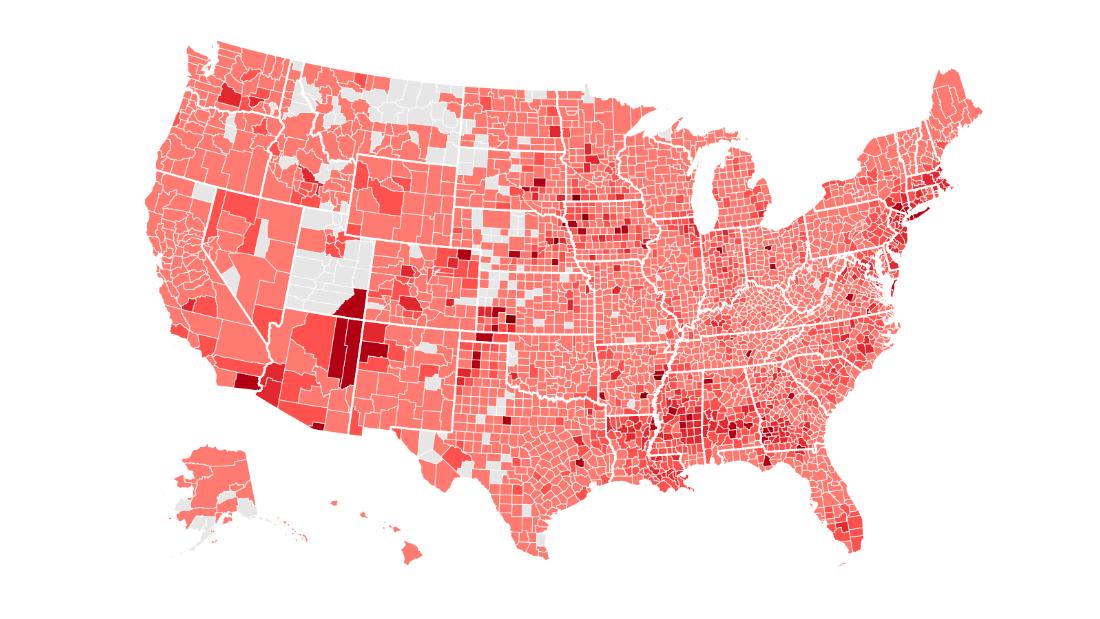Russia sees highest daily rise in infections since June
From CNN’s Zahra Ullah and Anna Chernova in Moscow
 Medical workers await patients at a hospital complex where people are treated for Covid-19 in New Moscow, Russia, on September 14. Maxim Shipenkov/EPA-EFE/Shutterstock
Medical workers await patients at a hospital complex where people are treated for Covid-19 in New Moscow, Russia, on September 14. Maxim Shipenkov/EPA-EFE/ShutterstockAuthorities in Russia said Friday another 7,212 new novel coronavirus infections had been identified throughout the country -- the highest daily number since June 23.
More than 1.1 million people in Russia have been infected since the pandemic began, killing at least 20,056. Public health officials said 108 Covid-19-related deaths were recorded Thursday.
A spike in Moscow: While cases are on the rise throughout the country, Moscow appears to be among the hardest hit. Another 1,560 new cases were announced on Friday, a steep jump from the 1,050 identified the day before.
Mayor Sergey Sobyanin is recommending businesses reinstate work-from-home arrangements. He also asked residents over 65 and those with chronic illnesses to avoid going outside, starting next week.
“Doctors have learned to diagnose and treat this disease. Nevertheless, according to doctors, the overlapping of two diseases, the common cold and the coronavirus, is very dangerous and can have dire consequences," Sobyanin said.
US still in first Covid-19 wave and should be prepared for "challenge" of fall and winter, Fauci says
From CNN's Christina Maxouris
The United States remains in the first wave of the Covid-19 pandemic, since cases never declined significantly to a good baseline, says Dr. Anthony Fauci, the nation's leading infectious disease expert.
The idea of a second wave is based on the pattern seen during the 1918 pandemic, when cases were seen in the spring and then cases "literally disappeared" before there was an "explosion" of cases in the fall, Fauci said.
Rather than say, 'A second wave,' why don't we say, 'Are we prepared for the challenge of the fall and the winter?'" Fauci said.
That challenge could include surges of Covid-19 cases across the country as more fronts open up, including the many schools and colleges nationwide that have welcomed students back to class. And as the weather gets cooler, more gatherings will move inside, where the virus can spread more easily.
There's also a potentially complicated flu season on its way that could pile on top of the pandemic and quickly overwhelm the healthcare system. The US Centers for Disease Control and Prevention director has warned it could be a historically difficult fall and winter.
Across the US, more than 6.9 million people have already been infected with the virus. CDC Director Dr. Robert Redfield said this week more than 90% of the population remains susceptible to the virus. At least 202,000 Americans have died.
As of early Friday morning, 23 states across the country's heartland and Midwest reported an increase of new cases compared to the previous week, according to data from Johns Hopkins University. About 16 states were trekking steady. Eleven states saw a decline -- Arizona, Connecticut, Delaware, Hawaii, Indiana, Maryland, Ohio, Pennsylvania, South Carolina, Vermont and Virginia.
Read the full story:
Watch: Africa's CDC chief explains continent's low death rate
From CNN's David McKenzie
The Covid-19 death rate in Africa has defied expectations and stayed relatively low.
CNN's David McKenzie speaks to Dr. John Nkengasong, Director of Africa's Centers for Disease Control and Prevention, about the continent's coronavirus response.
WATCH:
Opinion: Will the public trust a Covid-19 vaccine?
Opinion from Edgar K. Marcuse
Editor's Note: Edgar Marcuse is emeritus professor of pediatrics at the University of Washington. The opinions expressed in this commentary are those of the author.
Operation Warp Speed, the mission to develop an effective Covid-19 vaccine, seeks to deliver 300,000 doses by January 2021. According to projections from the University of Washington, by then the US death toll from the novel coronavirus will likely have reached nearly 400,000.
What evidence of vaccine effectiveness -- balanced by what assurance of safety -- would prompt you to seek a dose of one of these novel vaccines to protect an elderly family member or for yourself?
Optimal use of these Covid-19 vaccines will depend on the confidence of the American people in the processes leading up to the vaccines' release. The Food and Drug Administration's (FDA) Biologics License Application (BLA) is the standard path to vaccine licensing. The rigor and transparency of this process ensures clinician and public confidence in vaccine safety and efficacy.
But now there is concern the FDA will sidestep the BLA and instead use an Emergency Use Authorization (EUA) to speed access to these vaccines. If so, extraordinary actions will be needed to assure the public that these vaccines are very safe and effective.
Transparency: The EUA process for vaccine approval, should be fully transparent and include input from relevant federal advisory committees. The voting members of these committees are independent experts without ties to the federal government or to vaccine manufacturers. They should have access to the safety and efficacy data that informed the FDA's decision to use the EUA process for the vaccine's release. Only then can the process be seen as credible and free from political bias.
To foster trust in the expertise and integrity of those who review the vaccine and make recommendations to the public, there must be frequent communication from a group of HHS experts, such as leaders of Operation Warp Speed, the FDA and the Centers for Disease Control and Prevention, with only limited input from pharmaceutical representatives.
Read the full opinion:
Russia to supply up to 35 million doses of Sputnik V vaccine to Uzbekistan
From CNN's Simon Cullen
Russia’s sovereign wealth fund (RDIF) says it has agreed to supply up to 35 million doses of the Sputnik V vaccine to Uzbekistan.
RDF said in a statement that upon approval by Uzbekistan’s regulators, up to 10 million doses of the vaccine will be delivered to Tashkent-based pharmaceutical company Laxisam in 2020. As many as 25 million doses will be shipped in 2021.
RDIF said it had already reached supply agreements with Mexico, Brazil and India.
Russia was the first country to approve a coronavirus vaccine, but Moscow's claims were initially met with widespread concern and unanswered questions over the vaccine's safety, effectiveness and the speed at which it was developed.
Czech Republic records second-highest daily increase in coronavirus cases
From CNN's Simon Cullen in London
The Czech Republic has identified 2,913 new coronavirus infections in the past 24 hours, according to data from the country’s Health Ministry, the second highest daily increase since the pandemic began.
Three more virus-related deaths were also recorded.
Like many countries in Europe, the Czech Republic has been experiencing a surge in cases in recent weeks.
At least 58,374 cases of Covid-19 have been confirmed in the country since the pandemic began, killing 567 people, according to figures from Johns Hopkins University.
Israel records more than 7,500 new Covid-19 cases in highest single-day spike
From CNN’s Oren Liebermann in Jerusalem
Israel diagnosed 7,527 new coronavirus cases on Thursday -- a new daily high -- according to the country's Ministry of Health. It was the third straight day the country of fewer than 10 million people identified more than 7,000 cases.
The new figures come just as Israel is set to significantly tighten restrictions during the country’s second general lockdown. The measures take effect at 2 p.m. on Friday.
Prime Minister Benjamin Netanyahu has refused to take any responsibility for the coronavirus crisis in Israel. He has blamed the public for flouting the rules, experts who disagreed with a full lockdown and “populist politicians.”
The US is nearing 7 million coronavirus cases
From CNN's Alta Spells
At least 6,978,851 coronavirus cases have been identified in the United States, according to Johns Hopkins University, killing at least 202,818 people.
Another 44,110 cases and 914 new deaths were reported on Thursday, according to the university.
The totals include cases from all 50 states, the District of Columbia and other US territories, as well as repatriated cases.
CNN is tracking cases here:
South Korea announces tougher social distancing measures ahead of upcoming holiday
From CNN's Jake Kwon in Seoul, South Korea, and Sophie Jeong in Hong Kong
South Korea will implement strengthened social distancing measures around the nation’s upcoming Chuseok holidays, the government said.
Minister of Health Park Neung-hoo said in a briefing that restaurants and cafes with more than 20 seats in the Seoul metropolitan area will have to keep tables at a minimum distance of 1 meter apart unless dividers are installed. Movie theaters and internet cafes must leave one seat empty between clients.
Outside of the capital area, clubs, bars and other nightlife establishments must close during the holiday weeks.
These new measures will be implemented from Sept. 28 to Oct. 11.
Bans in place: Clubs and bars in the wider Seoul area are already closed under the current social distancing measures, as are gatherings of 50 or more people indoors and 100 or more people outdoors.
Park said the government will decide in the second week of Chuseok, after Oct. 12, how to proceed with social distancing measures.
Authorities said they had identified 114 new Covid-19 infections since Thursday, bringing the total number of cases in the nation to 23,455. At least 395 people have died.

 5 years ago
961
5 years ago
961 




